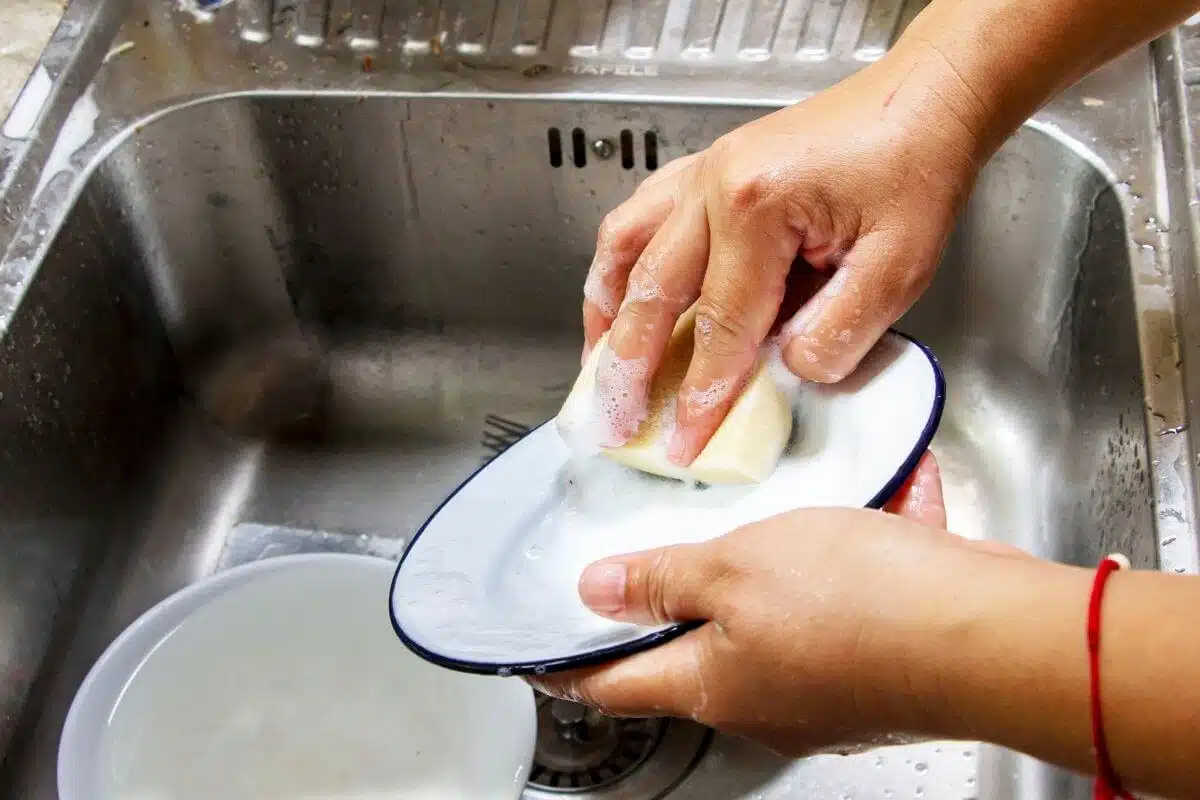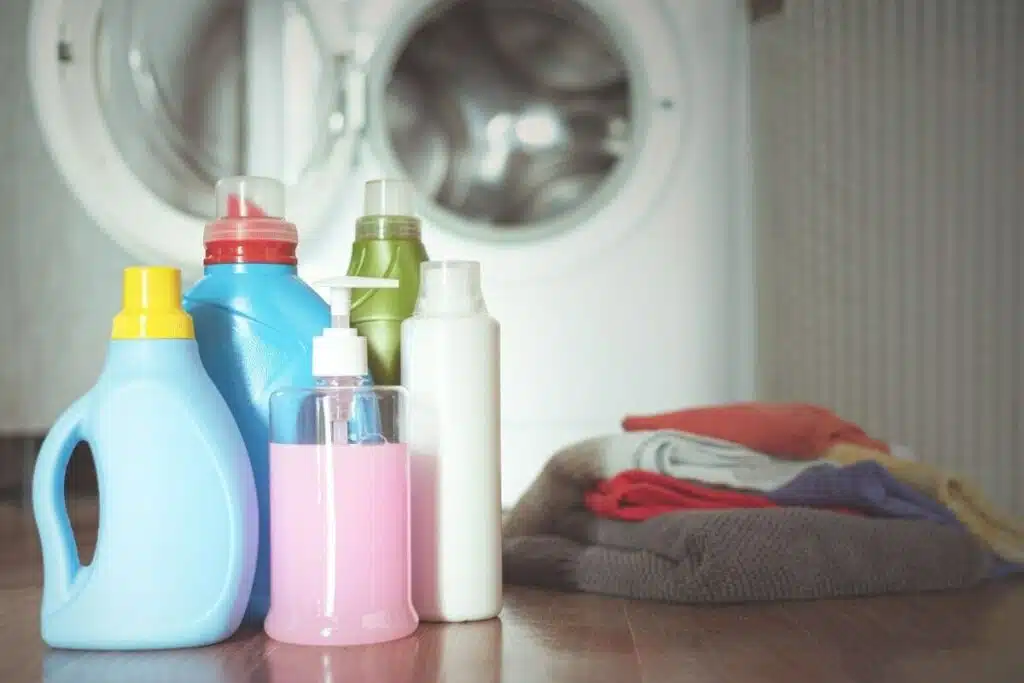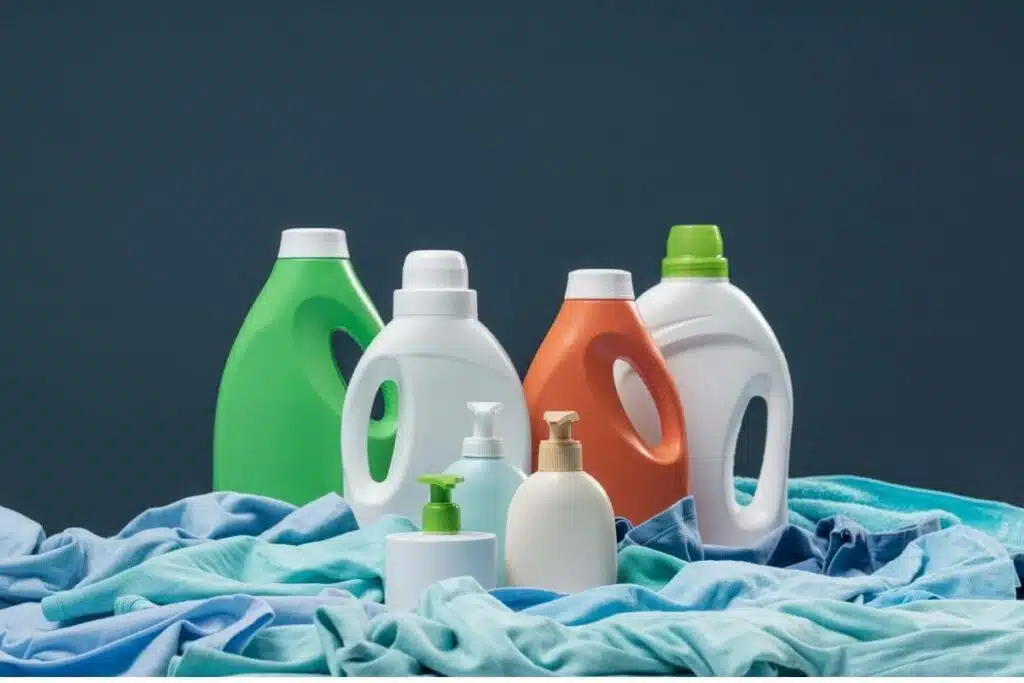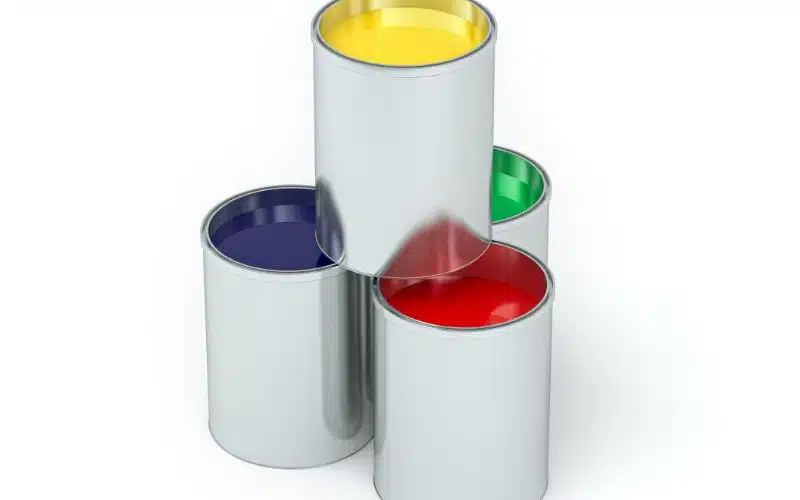Dishes sparkling clean, but wait, was that laundry detergent? That’s right, sometimes a mix-up in the kitchen leads to washing dishes with laundry soap.
It sounds odd, but it happens more often than you’d think. In this article, we’re diving into what happens when laundry detergent meets your dinner plates.
Is it a disaster, or perhaps a surprising discovery? Let’s find out together.
Important Takeaways
- Laundry Detergent Risks: Laundry detergents contain harmful chemicals like phosphates, bleach, dioxane, formaldehyde, and artificial fragrances, which can cause health issues ranging from skin irritation to cancer risks.
- Using Laundry Detergent in Dishwashers: Not recommended due to harsh chemicals that can harm health, damage dishwashers, and leave unwanted residues on dishes.
- Safer Alternatives: Bar soap, hand soap, and baking soda are safer and effective alternatives for dishwashing.
- Accidental Use of Laundry Detergent in Dishwashers: Immediately stop the cycle, rinse the dishwasher thoroughly, and clean the dishes with proper dish soap.

Is Laundry Detergent Toxic?
Laundry detergents often have more than 25 harmful chemicals. These chemicals, hidden behind words like ‘brightening’ and ‘whitening’, can cause health problems if we use them for a long time.
Now, let’s look at some of these dangerous chemicals.
#1. Phosphates
Phosphates in laundry detergent help to soften the water, which lets the detergent clean clothes better. But phosphates can end up in rivers and lakes where they feed algae that produce toxins. This can harm people and animals.
Here’s what you should know:
- Effects on Waterways: Phosphates can cause nutrient pollution and mineral poisoning.
- Health Concerns: Algae blooms can poison animals and cause sickness in people.
#2. Bleach
Bleach is good for making whites brighter. But it can be harmful if it touches your skin or eyes.
Potential issues with Bleach
- Skin and Eye Irritation: Contact with bleach can lead to burns.
- Respiratory Problems: The fumes from bleach are toxic and can harm your breathing.
#3. Dioxane
You won’t see dioxane listed on ingredients, but it can show up in detergents by accident.
Dioxane can be dangerous for your insides and is even linked to cancer. It’s important to be aware of:
- Cancer Risk: Exposure to high levels of dioxane can damage cells in the kidney, liver, and respiratory system.
#4. Formaldehyde
Formaldehyde is used to keep germs away and make detergents last longer. The problem is it’s also linked to cancer.
Here’s what you face with formaldehyde in detergents:
- Carcinogenic Properties: It’s classified as a probable carcinogen by agencies like the EPA.
- Associated Health Risks: Breathing it in or skin contact can lead to cancers, such as lung and nasopharyngeal cancer.
#5. Fragrance
That lovely scent on your clean clothes might not be so friendly. Artificial fragrances can cause skin and breathing issues.
Keep in mind that:
- Allergic Reactions: Fragrances can lead to rashes or allergic reactions on your skin.
- Respiratory Concerns: With constant inhaling, they could harm your lungs over time.
Is It Dangerous To Use Laundry Detergent In A Dishwasher?

Laundry detergents are not designed for dishwashers. They contain harsh chemicals that can be harmful. If these chemicals enter your body, they can create health issues.
Additionally, laundry detergent creates a lot of foam which can prevent water from cleaning your dishes effectively.
Using laundry detergent in a dishwasher can also lead to machine damage. The excess lather may stop water from spraying correctly.
Plus, typical ingredients like fragrances and stain removers may leave unwanted marks on dishes. These hard-to-remove residues are meant for clothes, not for dishware.
Furthermore, when laundry detergent is heated during the wash cycle, it can release toxic fumes.
These fumes pose a risk when inhaled. So, it’s important to keep laundry detergents separate from your dishwasher.
#1. Bar soap
You can use a bar of soap to clean your dishes. It’s safe and has been used for many years. Remember, rinsing the dishes well will remove any soap residue.
- Safety: Good, with proper rinsing
- Residue: Possible, rinse thoroughly
#2. Hand soap
Consider hand soap as an alternative. It’s gentler on the skin due to glycerin content. Plus, it works well with hot water for better lathering.
- Suitability: Fine for use
- Note: Best with hot water for more foam
#3. Baking soda
Baking soda, or sodium bicarbonate, effectively cleans dishes. Mix it with hot water to tackle grease and food residues.
- Benefits: Grease absorption and gentle cleaning
- How to use: Combine with hot water to create a cleaning gel
What Happens When You Put Laundry Detergent In Dishwasher?
Using laundry detergent in your dishwasher leads to excessive foam creation. This foam can overflow, creating a mess in your kitchen.
Continual use may result in scum buildup, which has the potential to damage your dishwasher.
If you accidentally start a wash cycle with laundry detergent, you should stop the cycle immediately.
Here’s what to do:
- Cancel the wash cycle; your dishwasher should begin draining.
- Remove dishes and decide whether to rinse them or wait until after cleaning the dishwasher.
After draining, rinse the dishwasher to eliminate all lather. To ensure it’s clean:
- Fill the appliance with water, check for suds, and if none, drain this water.
- Wipe down with a towel after removing all components, such as racks.
Lastly, run a rinse cycle to flush away any leftover residues. Your dishwasher is now ready to be used again with the correct type of detergent. Always choose detergent specifically made for dishwashers to avoid future issues.

What’s The Difference Between Dish Soap And Laundry Detergent?
Dish soap and laundry detergent serve similar purposes but have distinct differences in their formulation.
You use both to clean, but they are not interchangeable due to various components aimed at specific cleaning tasks.
Differences in Ingredients and Purpose:
- Dish Soap: It’s formulated with surfactants that are kind to your skin. This means it can cut through grease on your dishes while being gentle enough for manual washing.
- Laundry Detergent: Contains enzymes that tackle a variety of stains from clothing, like wine and oil, ensuring they come out in the wash.
pH Levels and Bleach Content:
| Dish Soap | Laundry Detergent |
|---|---|
| Neutral pH; not too acidic or alkaline | Varied pH; can be higher to effectively clean fabrics |
| No bleach; safe for washing by hand | Often contains bleach to remove tough stains |
How They Work:
- Dish Soap: Works by surrounding and lifting away food and grease from dishes. Glycerin and other softening agents are often included to protect your hands.
- Laundry Detergent: Aims to keep clothes fresh, soft, and free from wrinkles with built-in softeners and brighteners.
Remember, while both products clean, it’s best to use them for their intended purpose to avoid any damage to your dishes or clothes.
How Do You Get Laundry Detergent Out Of Dishes?

When you accidentally wash dishes with laundry detergent, it’s important to act swiftly.
Laundry detergents often contain fragrances designed to stay on fabrics, which can be harmful if left on dishes.
Hand wash your dishes using dish soap to clear away any detergent residue. Follow this with a thorough rinse using hot water to ensure no food residue or detergent scent remains.
- Rinse Dishes Vigorously: Use clean water to remove all traces of laundry detergent.
- Use Hot Water: A final rinse with hot water helps in removing any leftover smell.
- Dry Thoroughly: Before using the dishes, make sure they are completely dry to prevent any dampness from trapping residue.
For glass and cutlery, consider using a small amount of vinegar as a natural alternative for eliminating odors.
Wearing gloves while cleaning can protect your hands from the harsh substances.





